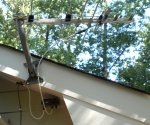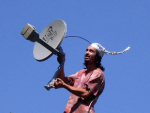The Original Rooster
Mayor of Spring Hill
Not a question but something I've learned since installing a very nice TV antenna on my roof several years ago. The manufacturers recommend using a dielectric grease on the threads of the connections to improve water repellency and to make it easy to disconnect in the future. When I installed it originally, I accidentally got some of the grease on the center copper wire of the cable when I installed the preamp. This caused some connection issues until I figured out what happened.
Last week one of the local thunderstorms caused enough static discharge to damage the preamp despite it being grounded so I replaced it today. I sprayed electrical contact cleaner on the connecter before carefully applying the dielectric grease without getting any on the center wire. Just a simple precaution to save you a lot of headache if you ever install an antenna yourself.
Last week one of the local thunderstorms caused enough static discharge to damage the preamp despite it being grounded so I replaced it today. I sprayed electrical contact cleaner on the connecter before carefully applying the dielectric grease without getting any on the center wire. Just a simple precaution to save you a lot of headache if you ever install an antenna yourself.
Last edited:


